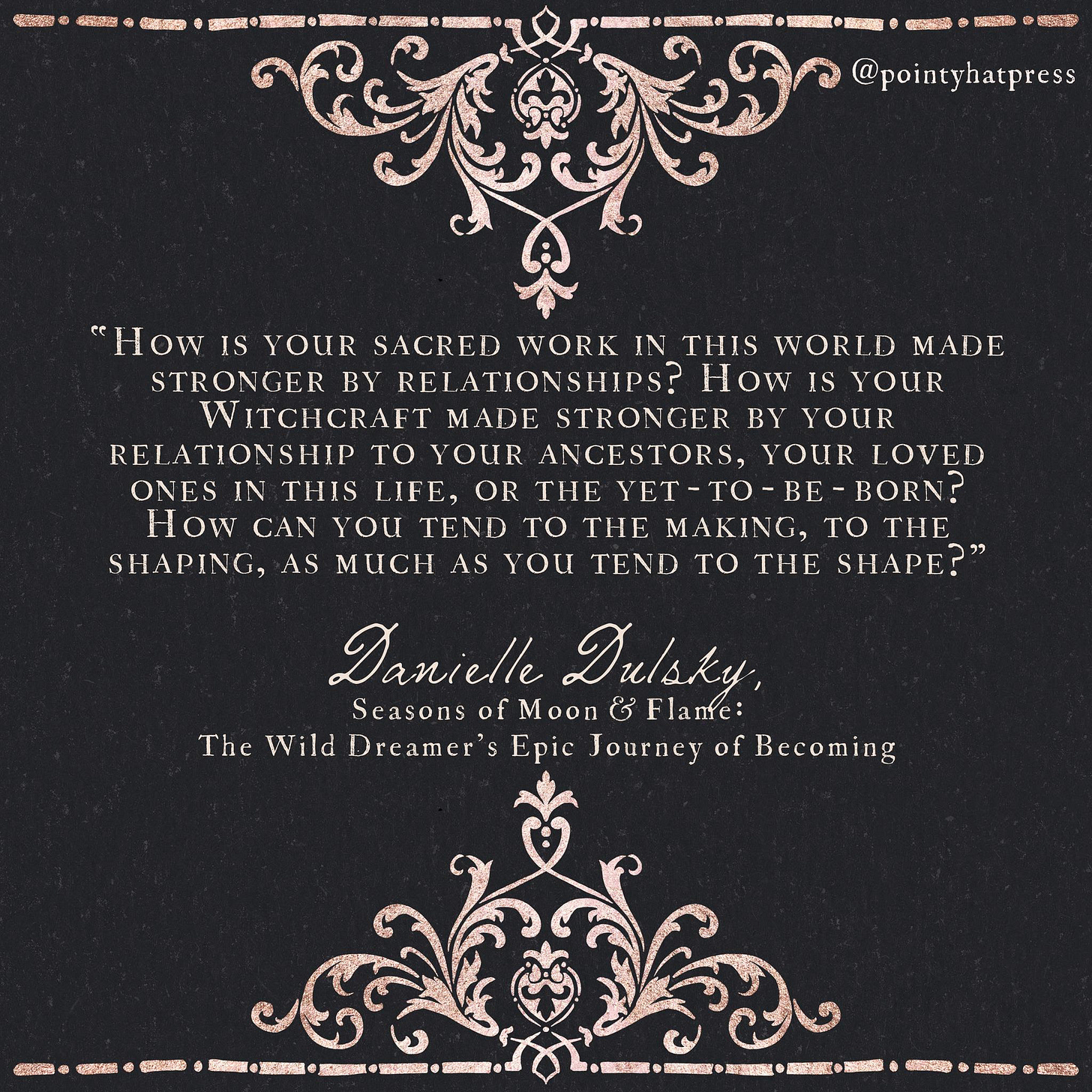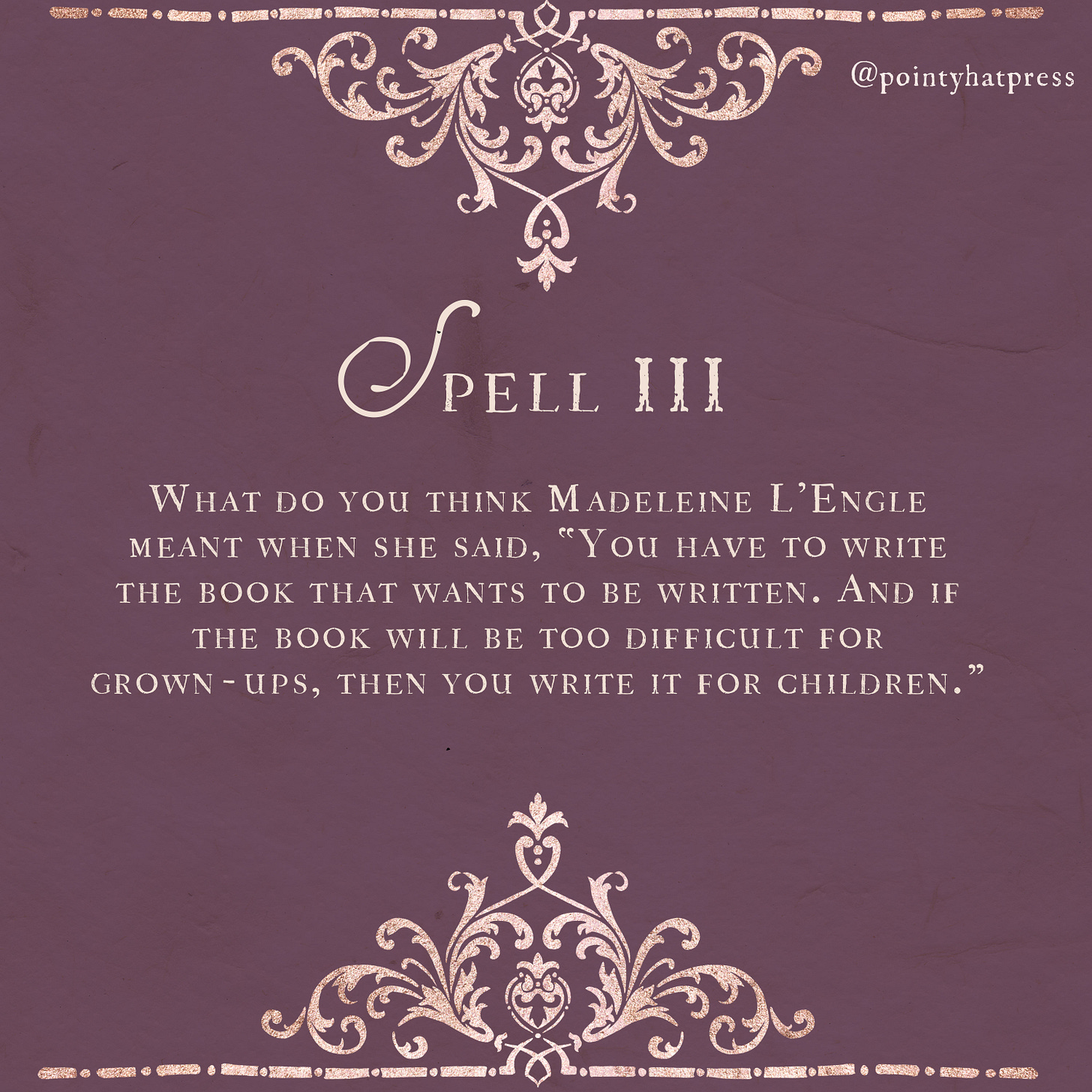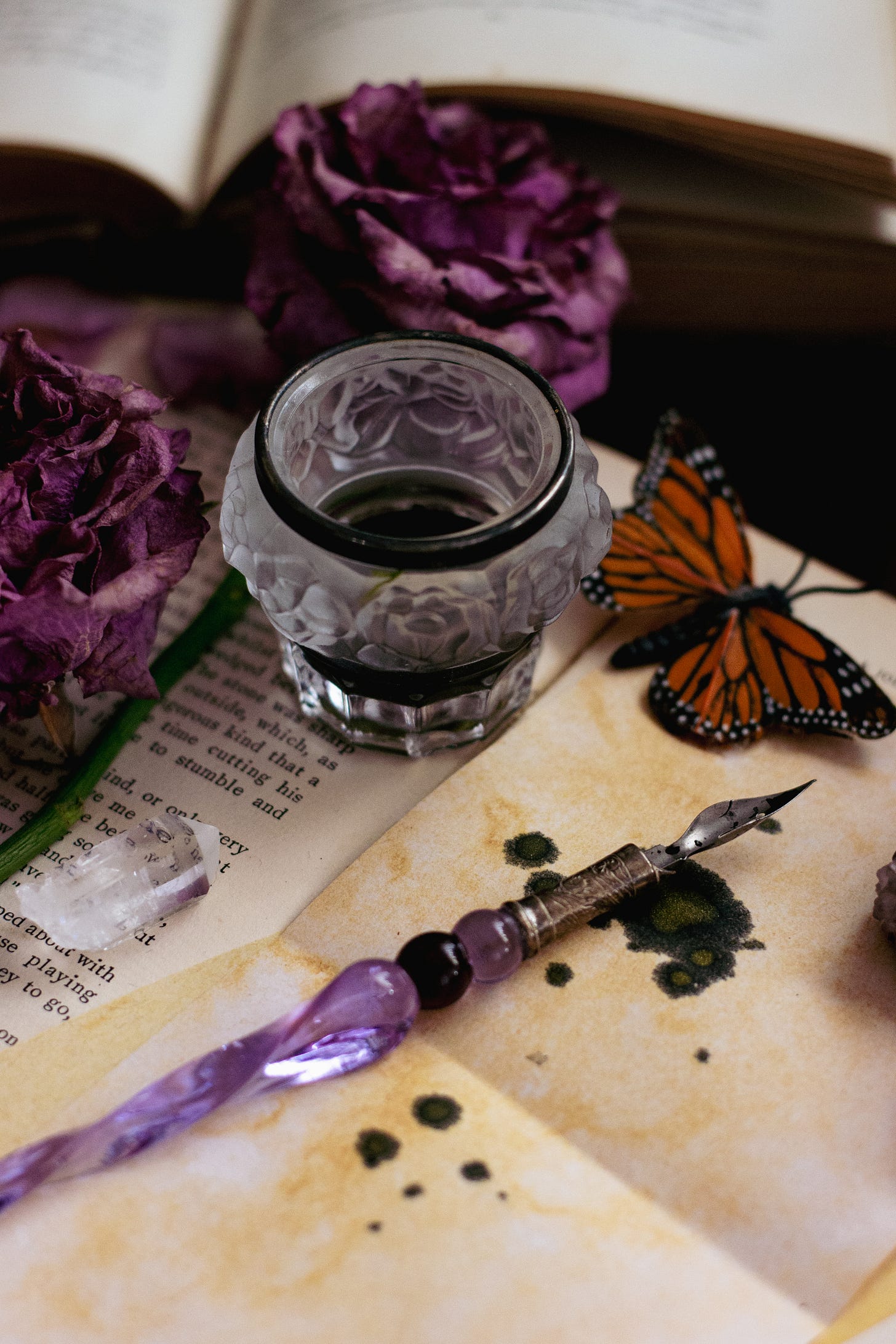Here at Pointy Hat Press and Little Witch Books, we're tapping into magical worlds through books, scripted spells, and a practice called literary spellcraft. Perhaps you know it as word witchery or intuitive writing, but literary spells are vehicles built from your words. Poetry, storytelling, dream journaling, bibliomancy, or putting pen to paper for ten minutes a day can be a spell when paired with an intention. Sometimes, literary magick involves naming our spectral muses and crafting odes from their memory. Word spells can be solo endeavors but also collaborative.
Horoscope writer Rob Brezsny says that early in his writing career, he began urging his readers to contact him telepathically,
“either while awake or during dreams or in any state in between those two. Would that actually work? I didn't know at first. But it was a fun prospect. Then, as now, I aspired to solicit influence and teaching from everywhere. Why not invite my readers to interweave with me via the realm that mystery religions and esoteric philosophies have referred to as the astral plane or astral world?” (Astrology Is Real: Revelations From My Life as an Oracle)
For some of us, literary spellcraft is the practice of showing up again and again for our art. It can be a portal into the woods or a passageway into the starry Above. It can be an astral gathering between far-flung friends. Our word spells construct bridges between worlds, and they need not be serious; they can also be the jokes that make someone laugh during a period of grief.
Author and witch Danielle Dulsky believes that some of our greatest magic lives in our art. She writes:
“Our Craft is in our art, so we consider our relationship to our witchery much like a painter’s relationship to a painting or a baker’s relationship to bread. We are the maker, yes, and the art is made, yes, but what of that third, less definable force that is the practice of the making. In Celtic spirituality this is the “shaping.” There is the shape, the shaper, and the shaping in the holy trinity of artistry: it is in that third piece where the magick sits.” (Seasons of Moon & Flame: The Wild Dreamer’s Epic Journey of Becoming)
This week, in honor of our inner word witches, we invite you to lean into your art, the mysteries penned in ink, and remember that words uphold the foundation of our craft.
11 Spells for the Literary Witch
Grab your journal, a cup of tea, and something to write with. Set your timer for 20 minutes and reflect on the questions below. You don’t have to respond to each one (we like to follow the wonderings and whisperings as they appear), but keep your pen moving; this is part of the spell!
· In fairy tales, a heroine might carry a golden bow or an old book in place of a sword. And when she’s tasked with the impossible, she summons miracles with a spinning wheel or a glossy, black quill. Based on the current chapter of your creative life, what magical tools hang from your belt, and what power do they wield?
· Using today’s date, divine some inspiration from your current read. For example, if the calendar says it’s December 27th, 2024, go to page 12, paragraph 9, line 8 (condense the day and year into single digits) to receive your message! Divination with books (in place of tarot cards or tea leaves) is known as bibliomancy.
· What do you think Madeleine L'Engle meant when she said, “You have to write the book that wants to be written. And if the book will be too difficult for grown-ups, then you write it for children.”
· Consider the moments when you do your best creative work. In the morning? In the evening? The writer and poet D.H. Lawrence said that when he was creatively blocked, he turned to the trees, for he always found inspiration resting in their branches. Consider three things (places, activities, time of day) that make you feel most inspired, and schedule some time with each of them. Journal the outcome and any ‘random’ thoughts that occurred during this experiment.
For word witches and bookish folk, reading is a ritual, and some people say a good book can make them fall into a trance. It mesmerizes. Trance is a form of mediumship that can act as a doorway between worlds, so next time you’re carrying around an important question, offer it to the literary spirits. Write your query on a piece of paper, tuck the paper between the pages of your current read (we like to use it as a bookmark), and after each chapter, consider not only your question and the words you’ve just read, but the ‘out-of-place’ thoughts that visited while reading.
· Make a list of the books you loved as a child or teen, and see if you can track one down at the library or a used bookstore (eBay is also great for sourcing out-of-print books!). While you’re reacquainting yourself with the book, consider the passages you remember, the ones you forgot about (or were different than you remember), and see which elements of the story are present in your life today. Revisiting old books, journals, and art projects is also a doorway into the enchanting world of nostalgia magick. Pen a poem or essay from the heart of that place.
· If you could summon a magickal mentor, partner, or muse, how might they support you? What would you two talk about? What stories will you exchange? Write out the details of your ideal mentorship or collaboration.
· Virginia Woolf longed for “inarticulate language, feet shuffling across the pavement in place of words.” Charles Baudelaire believed that to handle a language skillfully was to practice a kind of evocative sorcery. Margaret Atwood goes even further, saying that our language is everything we do. Tomas Tranströmer, a poet who often wrote about winter, believed that the wild did not have words, for “the unwritten pages spread themselves out in all directions…the marks of roe-deer’s hooves in the snow. Language, but no words.”
Forgetting everything you’ve been taught about spelling, grammar, and literary ‘rules,’ how would you describe ‘language’ to someone visiting from another time, or perhaps, another world?
· Answer the riddle, “Why is the raven like a writing desk?”
· Ursula K. Le Guin wrote, “The book itself is a curious artifact, not showy in its technology but complex and extremely efficient: a really neat little device, compact, often very pleasant to look at and handle, that can last decades, even centuries. It doesn't have to be plugged in, activated, or performed by a machine; all it needs is light, a human eye, and a human mind. It is not one of a kind, and it is not ephemeral. It lasts. It is reliable. If a book told you something when you were fifteen, it will tell it to you again when you're fifty, though you may understand it so differently that it seems you're reading a whole new book."
As a gift to future generations, you’re allowed to gift them one book. Which ‘curious artifact’ do you choose? Why?
· Finish this thought: Traditionally, December’s Moon has been called the Cold Moon and the Long Night Moon, but I’m reimagining it as…
Happy writing, witches! If you cast any of the above word spells, please tag Pointy Hat Press and our Literary Coven in the caption or comments!








I love all of this. 📚
Thank you. Bright, Magical, Literary Blessings to you in 2025.